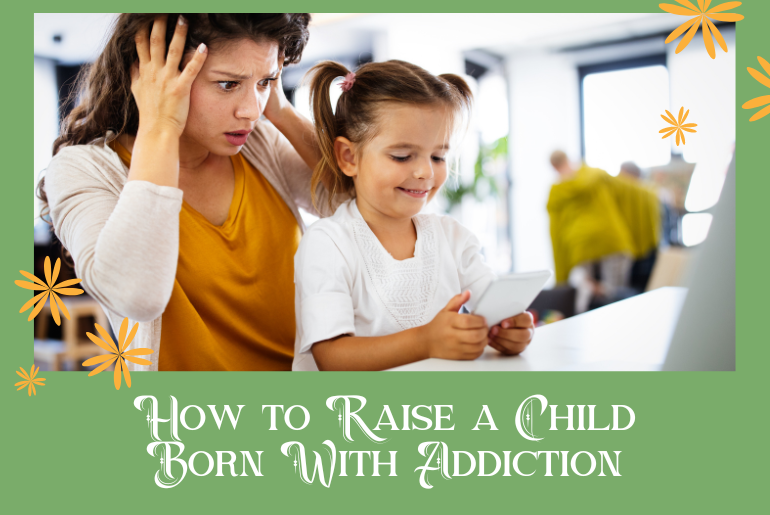In today’s world, where substance abuse is unfortunately prevalent, the challenge of raising a child born with addiction can feel overwhelming. However, with the right support, guidance, and understanding, it’s possible to navigate this journey successfully. In this article, we’ll explore effective strategies and insights for parents and caregivers facing this unique circumstance.
Understanding Addiction from Birth

Understanding addiction from birth is crucial for effective parenting. Babies born addicted to substances such as opioids may experience withdrawal symptoms, known as Neonatal Abstinence Syndrome (NAS). Recognizing these symptoms and understanding the underlying causes is the first step towards providing appropriate care and support.
Neonatal Abstinence Syndrome (NAS) refers to the withdrawal symptoms experienced by infants exposed to addictive substances in the womb. Symptoms can vary widely and may include tremors, excessive crying, feeding difficulties, and irritability. It’s essential for parents to be aware of these signs and seek medical assistance promptly.
Tips for Raising a Child Born With Addiction

Consider the following tips to raise your child born with addiction:
1. Create a Supportive Environment
A supportive environment is paramount for the well-being of a child born with addiction. Love, patience, and understanding are key components of this nurturing environment. Building trust and security is essential for children with addiction. Consistent routines, affection, and positive reinforcement help foster a sense of security and stability in their lives.
2. Seek Professional Help
You need help from experts who know about addiction. From medical professionals to therapists specializing in addiction, accessing the right support network can make a significant difference in the child’s development and the family’s well-being. You can start here to contact a group of experts.
Pediatric specialists play a crucial role in managing the health and development of children born with addiction. Regular check-ups, developmental screenings, and tailored interventions are essential aspects of pediatric care in this context.
3. Educate Yourself
Endeavour to know about addiction and its effects. When you do this, you can better advocate for their needs and make informed decisions about their care. Staying informed about addiction also allows parents to recognize triggers, implement preventive measures, and access relevant resources. Online forums, support groups, and educational materials are valuable sources of information and support.
4. Promote Healthy Habits
Healthy habits from an early age are crucial for children born with addiction. Encouraging nutritious eating, regular exercise, and engaging in positive activities can support their physical and emotional well-being. Also, encouraging positive peer relationships helps children develop social skills and build resilience.
5. Instill Confidence and Resilience
Confidence and resilience empower children to overcome challenges and thrive despite adversity. Celebrating their achievements, acknowledging their efforts, and providing encouragement can help build their self-esteem and resilience.
Also, celebrating milestones and achievements boosts children’s confidence and reinforces their sense of accomplishment. Whether it’s mastering a new skill or reaching a personal goal, acknowledging their successes fosters a positive sense of self-worth.
6. Embrace Open Communication
Open communication, no doubt fosters trust and understanding within the family. Creating a safe space for dialogue allows children to express their thoughts, feelings, and concerns without fear of judgment. In furtherance to that, active listening and empathy are essential components of effective communication. When you listen attentively to your child’s perspective and validate their emotions, you can strengthen their bond and build mutual trust.
7. Encourage Healthy Coping Mechanisms
Coping mechanisms help children manage stress and constructively navigate challenges. From mindfulness techniques to creative outlets, providing alternative ways to cope fosters resilience and emotional well-being. Some therapeutic activities such as art therapy, music therapy, or nature walks can be beneficial for children with addiction. These activities provide a non-verbal outlet for expression and promote emotional healing.
How to Know if Your Child Is Born With Addiction

Identifying whether your child is born with addiction requires careful observation and awareness of potential signs and symptoms. Below are key indicators to help you recognize if your child may be struggling with addiction:
1. Prenatal Exposure
If the mother used substances during pregnancy, such as drugs or alcohol, there is a higher risk that the child may be born with addiction. Prenatal exposure can lead to various health complications and developmental challenges for the child.
2. Neonatal Abstinence Syndrome (NAS)
NAS, as previously discussed, occurs when a newborn experiences withdrawal symptoms after being exposed to addictive substances in utero. Symptoms may include irritability, feeding difficulties, tremors, and excessive crying. If your newborn displays these symptoms, it may indicate prenatal exposure and potential addiction.
3. Genetic Predisposition
Children born to parents with a history of addiction are at a higher risk of developing addiction themselves. Genetic factors can influence a child’s susceptibility to addiction and should be considered when assessing their risk.
4. Developmental Delays
Children born with addiction may experience delays in their physical, cognitive, or emotional development. These delays can manifest as difficulties in reaching developmental milestones or exhibiting age-appropriate behaviours.
5. Behavioural Changes
Pay attention to any sudden or significant changes in your child’s behaviour, such as increased aggression, mood swings, or social withdrawal. These changes could indicate underlying issues, including addiction.
6. Physical Symptoms
Keep an eye out for physical symptoms that may accompany addiction, such as changes in appetite, sleep disturbances, or unexplained injuries. These symptoms may be a result of substance abuse or related health complications.
7. Obsession with Substance Use
If your child demonstrates an intense preoccupation or obsession with substances, such as constantly talking about drugs or alcohol, seeking out opportunities to use, or displaying withdrawal symptoms when unable to access substances, it may be a sign of addiction.
8. Difficulty in School or Relationships
Addiction can negatively impact a child’s academic performance and social interactions. Look for signs of declining grades, frequent absences, conflicts with peers or authority figures, and a lack of interest in previously enjoyed activities.
FAQs
1. Is addiction in newborns common?
Addiction in newborns, while not as common as in adults, can occur due to various factors such as maternal substance abuse during pregnancy.
2. Can a child born with addiction recover?
Yes, with early intervention, appropriate treatment, and supportive caregiving, children born with addiction can recover and thrive.
3. What support is available for caregivers of children with addiction?
Caregivers can access support through healthcare professionals, support groups, and community resources specializing in pediatric addiction.
4. Is addiction in newborns treatable?
Yes, addiction in newborns is treatable with appropriate medical care, supportive interventions, and early intervention services. Medical professionals specializing in neonatal care can provide tailored treatment plans to address withdrawal symptoms and support the infant’s health and development.
5. What should I do if I suspect a child is born with addiction?
If you suspect a child is born with addiction, seek immediate medical attention to ensure timely assessment and appropriate interventions for their well-being.
Conclusion
Raising a child born with addiction presents unique challenges, but with love, support, and the right resources, parents can help their child thrive. Patience is also crucial as it takes time to successfully navigate it, but reward is sure at the end.

Dedicated father, an accomplished psychologist, and an experienced educationist. With a passion for guiding parents on the rewarding journey of raising children, I am the perfect companion for all your parenting needs. My insightful and practical advice, coupled with my wealth of experience, makes me the go-to expert for all matters related to parenting. Follow this blog for a glimpse into the world of effective parenting and learn how to navigate the ups and downs of this beautiful journey with confidence and grace.




One response to “How to Raise a Child Born With Addiction”
Usually I do not read article on blogs however I would like to say that this writeup very compelled me to take a look at and do so Your writing taste has been amazed me Thanks quite nice post